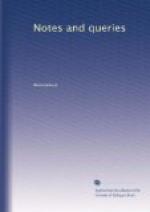Selago.—This plant, I should think it probable, is the Lycopodium clavatum of modern botanists; the seeds of which, when ripe, and when the plant is struck, rise like smoke ("fumum” of Pliny), and may have been supposed, from their remarkable inflammability when dashed into a flame, igniting with a sudden flash, to have possessed wonderful virtues. The species known as Lycopodium selago is rare in comparison to the other.
Portugal.—In the library of the Geographical Society are some of the more recent works published in Lisbon on the topography of that country, but they are generally very meagre and unsatisfactory. In a periodical published in Lisbon in numbers, on the plan of the Penny Magazine, there is a good deal of information, with engravings, regarding many places of interest in Portugal. I think it is called The Album, but I am sorry I have not at present the power of sending you more correct particulars concerning it. It is in 4to.
Portugal is a country that is so little travelled in either by natives or foreigners, that information regarding places in the interior is not easily obtained; and facilities for travelling, as well as accommodation for travellers, is of a very limited description.
Sir Roger de Coverley.—In one of your early numbers was a query on this subject, which I do not think has been yet answered. I have a MS. {369} account of the family of Calverley, of Calverley, in Yorkshire, an autograph of Ralph Thoresby in the year 1717, in which occurs the following passage:—
“Roger, so named from the Archbishop” (of York), “was a person of renowned hospitality, since, at this day, the obsolete known tune of Roger a Calverley is referred to him, who, according to the custom of those times, kept his minstrells, from that their office named harpers, which became a family and possessed lands till late years in and about Calverley, called to this day Harpersroids and Harper’s Spring.... He was a knight, and lived in the time of K. Richard 1st. His seal, appended to one of his charters, is large, with a chevalier on horseback.”
W. CALVERLEY TREVELYAN.
* * * * *
DERIVATIONS OF “NEWS.”
It is not declared with what motive “Mr. GUTCH” (No. 17. p. 270.) has laid before the readers of “NOTES AND QUERIES” the alleged derivation of N.E.W.S.
It must therefore be supposed, that his object was to have its justness and probability commented upon; and it is quite time that they should be so, since the derivation in question has of late become quite a favourite authoritative dictum with etymology compilers. Thus it may be found, in the very words and form adopted by your correspondent, in Haydn’s Dictionary of Dates, and in other authorities of equal weight.
This sort of initial-letter derivation was probably brought into fashion in England by the alleged origin of “Cabal,” or, perhaps, by the many guesses at the much disputed word “AEra.” I shall take the liberty of quoting a few sentences with reference to such etymologies, as a class, which I find in an unpublished manuscript upon a kindred subject.




